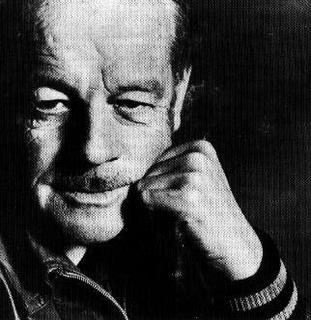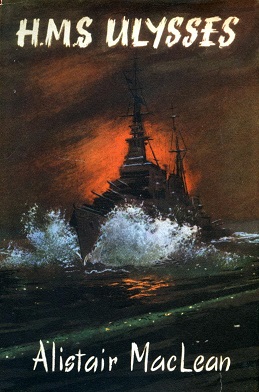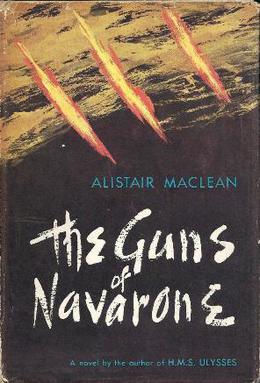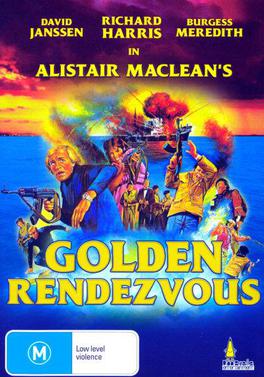A techno-thriller or technothriller is a hybrid genre drawing from science fiction, thrillers, spy fiction, action, and war novels. They include a disproportionate amount of technical details on their subject matter ; only hard science fiction tends towards a comparable level of supporting detail on the technical side. The inner workings of technology and the mechanics of various disciplines are thoroughly explored, and the plot often turns on the particulars of that exploration. This genre began to exist and establish itself in the early 20th century with further developments and focus on the genre in the mid 20th century.

Alistair Stuart MacLean was a Scottish novelist who wrote popular thrillers and adventure stories. Many of his novels have been adapted to film, most notably The Guns of Navarone (1957) and Ice Station Zebra (1963). In the late 1960s, encouraged by film producer Elliott Kastner, MacLean began to write original screenplays, concurrently with an accompanying novel. The most successful was the first of these, the 1968 film Where Eagles Dare, which was also a bestselling novel. MacLean also published two novels under the pseudonym Ian Stuart. His books are estimated to have sold over 150 million copies, making him one of the best-selling fiction authors of all time.

Ice Station Zebra is a 1963 thriller novel written by Scottish author Alistair MacLean. It marked a return to MacLean's classic Arctic setting. After completing this novel, whose plot line parallels real-life events during the Cold War, MacLean retired from writing for three years. In 1968 it was loosely adapted into a film of the same name.

Bear Island is a thriller novel by Scottish author Alistair MacLean. Originally published in 1971 with a cover by Norman Weaver, it was the last of MacLean's novels to be written in first-person narrative. This novel is a murder mystery with the added twist that the scene of the crimes is Bear Island, an island in the Svalbard archipelago of the Norwegian Arctic.

HMS Ulysses was the debut novel by Scottish author Alistair MacLean. Originally published in 1955, it was also released by Fontana Books in 1960. MacLean's experiences in the Royal Navy during World War II provided the background and the Arctic convoys to Murmansk provided the basis for the story, which was written at a publisher's request after he'd won a short-story competition the previous year.

The Satan Bug is a first-person narrative thriller novel written by Scottish author Alistair MacLean. It was originally published in 1962 under the pseudonym Ian Stuart, and later republished under MacLean's own name.

When Eight Bells Toll is a first-person narrative novel written by Scottish author Alistair MacLean and published in 1966. It marked MacLean's return after a three-year gap, following the publication of Ice Station Zebra (1963), during which time he had run several restaurants.

The Guns of Navarone is a 1957 novel about the Second World War by Scottish writer Alistair MacLean that was made into the film The Guns of Navarone in 1961. The story concerns the efforts of an Allied commando team to destroy a seemingly impregnable German fortress that threatens Allied naval ships in the Aegean Sea and prevents over 1,200 isolated British Army soldiers from being rescued.

South by Java Head is the third novel written by Scottish author Alistair MacLean, and was first published in 1958.

Puppet on a Chain is a novel by Scottish author Alistair MacLean. Originally published in 1969 with a cover by Norman Weaver, it is set in the late 1960s narcotics underworld of Amsterdam and other locations in the Netherlands.

Seawitch is a novel written by the Scottish author Alistair MacLean. It was first released in the United Kingdom by Collins in 1977 and later in the same year by Doubleday in the United States.

The Golden Gate is a novel written by the Scottish author Alistair MacLean. It was first released in the United Kingdom by Collins in 1976 and later in the same year by Doubleday in the United States.

Caravan to Vaccarès is a novel by author Alistair MacLean, originally published in 1970. This novel is set in the Provence region of southern France. The novel was originally written as a screenplay for producer Elliot Kastner.

The Dark Crusader is a 1961 thriller novel by Scottish author Alistair MacLean. The book was initially published under the pseudonym Ian Stuart and later under his true name. It was released in the United States under the title: The Black Shrike.

When Eight Bells Toll is a 1971 action film directed by Étienne Périer and starring Anthony Hopkins, Jack Hawkins, Robert Morley, and Nathalie Delon. Set in Scotland, it is based upon Scottish author Alistair MacLean's 1965 novel of the same name. Producer Elliott Kastner planned to produce a string of realistic gritty espionage thrillers to rival the James Bond series, but the film's poor box office receipts ended his plans.

Goodbye California is a novel by Scottish author Alistair MacLean, first published in 1977.

Golden Rendezvous is a 1977 South African action thriller film directed by Ashley Lazarus and starring Richard Harris, Ann Turkel and David Janssen. It was based on the 1962 novel The Golden Rendezvous by Alistair MacLean.

Caribbean Gold is a 1952 American historical pirate adventure film directed by Edward Ludwig and starring John Payne, Arlene Dahl and Cedric Hardwicke. It was produced by Pine-Thomas Productions for distribution by Paramount Pictures and was based on the novel Carib Gold by Ellery Clark. The film's sets were designed by the art director Hal Pereira. It is also known by the alternative title Caribbean.















